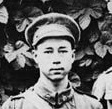Pte
William Allbright
Informations sur naissance
|
Date de naissance: 04/11/1894 |
|
Lieu de naissance: Northampton, Northamptonshire, Angleterre, Royaume-Uni |
Informations générales
|
Profession: Cordonnier |
Informations service militaire
|
Pays: Canada |
|
Force armée: Canadian Expeditionary Force |
|
Rang: Private |
|
Numéro de service: 404984 |
|
Incorporation date: 09/06/1915 |
|
Incorporation nom de lieu: Niagara Camp, Ontario, Canada |
|
Unités: — Canadian Infantry, 20th Bn. (Central Ontario) (Dernière unité connue) |
Informations sur décès
|
Date de décès: 05/11/1917 |
|
Lieu de décès: No. 3 Australian Casualty Clearing Station, Nine Elms, Poperinge, Belgique |
|
Cause du décès: Died of wounds (D.O.W.) |
|
Âge: 23 |
Cimetière
|
Nine Elms British Cemetery Parcelle: VIII Rangée: C Tombe: 20 |
Distinctions et médailles 2
|
British War Medal Médaille |
|
Victory Medal Médaille |
Points d'intérêt 3
| #1 | Lieu de naissance | ||
| #2 | Lieu d'enrôlement | ||
| #3 | Lieu du décès (approximatif) |
Mon histoire
William Allbright was born in Northampton, England in 1894. At the age of 19 William emigrated to Canada, where he started working as a Shoemaker. A couple of months later the Great War erupted in Europe. William decided to do his share and in June 1915 he joined the Canadian Expeditionary Force. Roughly two years later, by the time of the Battle of Passchendaele, William served with the 20th Battalion Canadian Infantry (Central Ontario), part of the 4th Brigade, of the 2nd Canadian Division.
On 2 November 1917 the 20th Battalion moved forward towards the lines in front of Passchendaele. The march was long and arduous, most of it being along a narrow wooden walkway. When the Battalion reached Abraham Heights, the men positioned themselves as best as they could. There was almost no cover to be found, the ground was boggy and wet and the shelling was nearly constant. Battalion Headquarters were installed in a large shell hole on Hill 37, with only a piece of tarpaulin as roof cover. Headquarters were moved to pill-box near Hill 35 on the following day.
The shelling of the Battalion’s positions on Abraham Heights remained fairly heavy. After nearly three days William’s unit was eventually relieved in the early hours of the 5th of November. But the shelling did not die down during the relief. Two men were killed on the way out. Another ten men were wounded. Making a total of 53 casualties during the 20th Battalion’s short stay in the line.
Private William Albright was gravely wounded during the relief. The young man sustained shrapnel wounds in the buttock and left thigh. William eventually died of his wounds at the No. 3 Australian Casualty Clearing Station on the 5th of November 1917, one day after his 23rd birthday.
On 2 November 1917 the 20th Battalion moved forward towards the lines in front of Passchendaele. The march was long and arduous, most of it being along a narrow wooden walkway. When the Battalion reached Abraham Heights, the men positioned themselves as best as they could. There was almost no cover to be found, the ground was boggy and wet and the shelling was nearly constant. Battalion Headquarters were installed in a large shell hole on Hill 37, with only a piece of tarpaulin as roof cover. Headquarters were moved to pill-box near Hill 35 on the following day.
The shelling of the Battalion’s positions on Abraham Heights remained fairly heavy. After nearly three days William’s unit was eventually relieved in the early hours of the 5th of November. But the shelling did not die down during the relief. Two men were killed on the way out. Another ten men were wounded. Making a total of 53 casualties during the 20th Battalion’s short stay in the line.
Private William Albright was gravely wounded during the relief. The young man sustained shrapnel wounds in the buttock and left thigh. William eventually died of his wounds at the No. 3 Australian Casualty Clearing Station on the 5th of November 1917, one day after his 23rd birthday.
